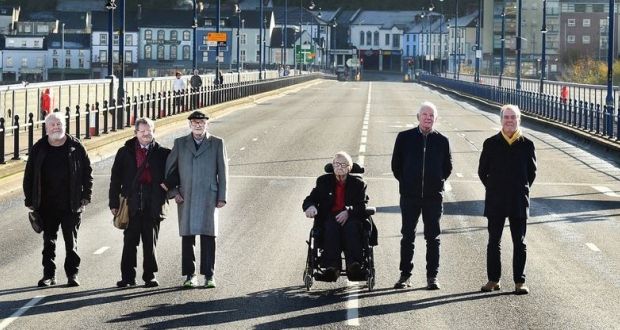
Fionnbarra Ó Dochartaigh (second from the left), with Trevor McBride, Dermie McClenaghan, Michael Canavan, Ivan Cooper, Terry Doherty and Aidan McKinney, recreating a photo from the civil rights movement on the Craigavon Bridge in 2018. Photograph: Freya McClements/Irish Times
He was one of the organisers of the civil rights march on Duke Street in Derry in October 1968, which is regarded as one of the starting points of the Troubles, and was a lifelong activist and campaigner.
A member of the Derry Housing Action Committee, he was a prominent figure in the housing protests which preceded the emergence of the civil rights movement in the city in the late 1960s.
From a republican family, Mr Ó Dochartaigh joined the civil rights campaign after his older brother was interned for speaking Irish.
He attended the Duke Street march with twin sister Deirdre, who later told The Irish Times how they hid in a cafe after the marchers were attacked by the police.
“We took off our coats which were covered in blood [but] they came in looking for us. I remember an RUC man with his baton, I remember the look of hatred on his face, I’ll never forget it.”
He was the author of several books, including Ulster’s White Negroes: From Civil Rights to Insurrection and in 2018 was awarded a lifetime achievement award by the civil rights 1968 commemoration committee.
Later that year he took part in a reconstruction of one of the most famous photographs of the civil rights era for The Irish Times, in which he and other civil rights activists were pictured on the city’s Craigavon Bridge at the head of 20,000 marchers.
“We knew deep down we wanted change, and we weren’t going to wait another generation,” he sa
He recalled being pushed forward by the crowd until suddenly he found himself on the other side of a police barricade.
“There were 20,000 people there at least. Had that many turned up at Duke Street history could have been different, the police might not have attacked.
“There’s no doubt it was a very, very important march… it was significant in so far as the number that turned out, and the reforms that came very soon afterwards,” he said.
“I think the [creation of the] Housing Executive was the most important achievement of all.”
Asked if he was proud of his contribution, he replied: “Oh yes. We should have been born with those rights.”
The SDLP leader Colum Eastwood paid tribute to Mr Ó Dochartaigh, saying he was “very sad to learn of his passing”.
“In his words, ‘there are different rights to be fought for now but it’s for the younger generation; we pass the baton on to them’,” said the Foyle MP.
John Kelly, whose brother was killed on Bloody Sunday, said Mr Ó Dochartaigh had been a “great friend and supporter”, who had “stood with the families over the many years of campaigning for truth and justice.”
Referring to the death of Pat Hume, the wife of former SDLP leader and Nobel laureate John Hume, on Thursday, Mr Kelly said Mr Ó Dochartaigh was “another stalwart of the civil rights movement lost in the past week”.
Tags:




